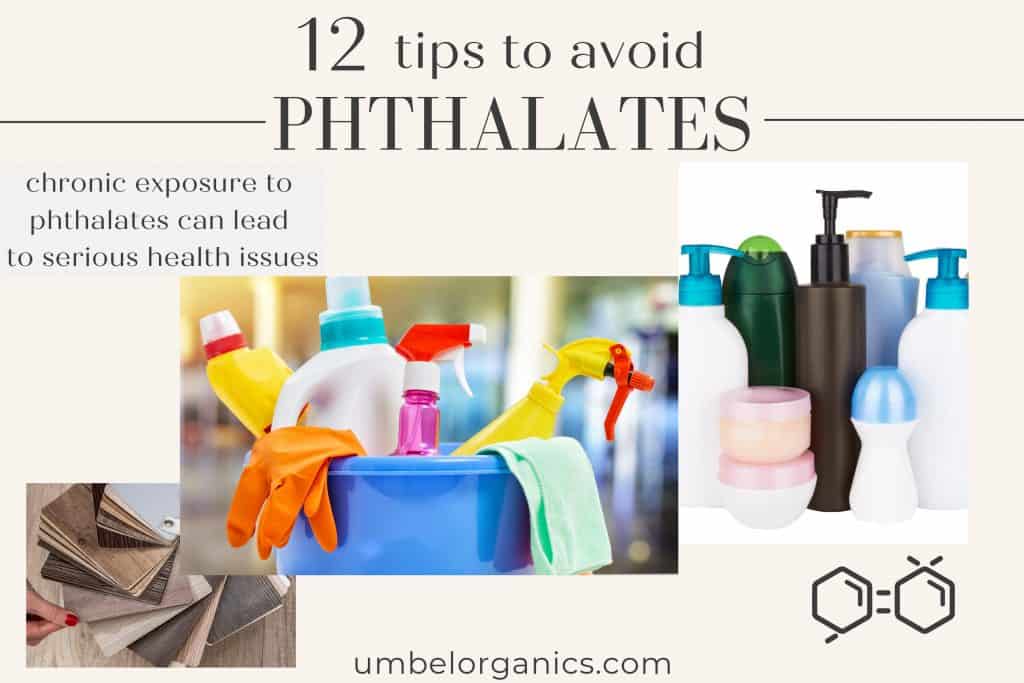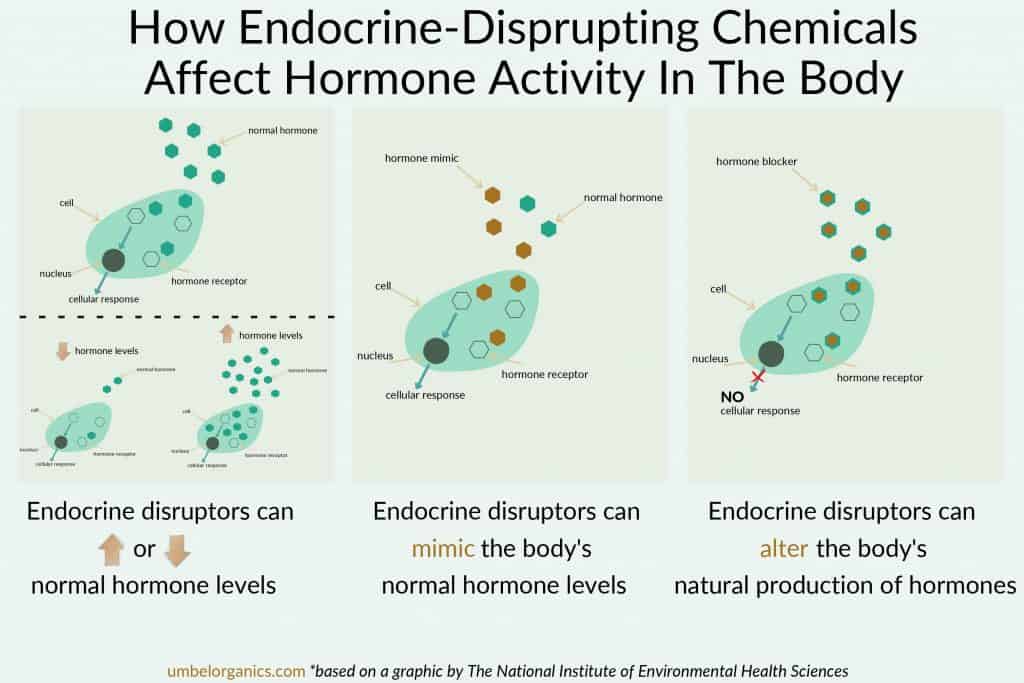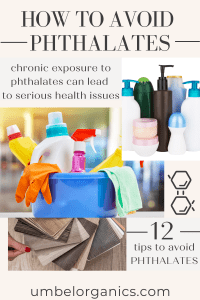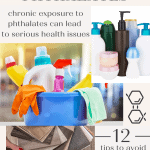How To Avoid Phthalates And Protect Your Health
From shampoo to processed food to laundry detergent, phthalates are in just about everything. Phthalate chemicals are added to plastic, personal care products, fragrance, everyday household items and more. Chronic exposure to phthalates can cause a myriad of health issues, so it’s important to take simple steps to avoid phthalate exposure.

Disclosure: This post contains affiliate links, which means if you make a purchase through these links, we may receive a small commission at no extra cost to you.
Cosmetics and personal care products like body lotion and deodorant, air fresheners, cleaning supplies, food packaging, electronics, vinyl flooring and shower curtains, all have one thing in common – they contain phthalates. Phthalates seem to be everywhere, and that’s because they’re used to soften plastic, extend the life of fragrance, help lotion penetrate the skin, and provide lubrication for products.
A recent 2021 study measured phthalate levels in urine in 5,000 participants between the ages of 55 and 64. After controlling for preexisting conditions like cancer and heart disease, as well as lifestyle habits and body mass, researchers found an association between high levels of phthalates and risk of early death (1).
This study is just one of many that reveals the serious health implications from exposure to phthalate chemicals in our everyday environment. From what shampoo we use to how the food we eat is packaged to our laundry detergent, exposure to phthalates comes in many forms. Although we can’t surround ourselves in bubbles and avoid all contact with phthalates, we can make conscious decisions to buy personal care products that don’t contain fragrance and switch to glass containers to store food and read labels before buying cleaning supplies.
What Are Phthalates?
Also referred to as ortho-phthalates, phthalates are a large class of synthetic chemicals that make plastic more flexible, and also act as binding agents, among other uses. Phthalates have properties that are advantageous from a production and manufacturing point of view – they are inexpensive and odorless additives, so they are an easy route to producing products with certain qualities like flexible plastic and products that stay scented for long periods of time. However useful they may be, there are numerous scientific studies linking phthalate exposure to harmful health effects.
What Products Contain Phthalates?
Any product made with Polyvinyl chloride (PVC, look for #3 or V on the label), automobile interiors, building materials, shower curtains, personal care products, cosmetics, fragrance (fragrance or parfume can contain phthalates, but companies are not required to list this), medical devices, children’s toys, food packaging, bottle nipples and more.
How Are We Exposed To Phthalates?
People can be exposed to phthalates by eating food that was packaged or heated in a plastic container or food wrapper, through breathing in dust particles that are contaminated with phthalates, through absorption and dermal exposure of personal care products and breathing in VOCs from cleaning supplies, among other routes of exposure. Phthalates have been found in human urine, bodily fluids and breast milk.
Did you know? A 2016 study analyzed dust samples from homes in 14 states and found that 100% of dust samples contained phthalates (2).
Are Phthalates Endocrine Disruptors?
Yes, phthalates are established endocrine disruptors. Exposure to phthalates can interfere with hormone production, distribution and/or hormone signaling, which can cause a wide range of health issues. Some of these health issues include:
- Reproductive abnormalities
- Increased risk of developing cancer
- Obesity
- Attention and Behavioral problems in children
- Asthma
- Reproductive/Fertility problems
- Diabetes
- Autoimmune disorders
Did you know? Even low doses of endocrine-disrupting chemicals can disrupt how your hormones interact with your body. The endocrine system is extremely important in utero and during infancy because it manages the development of each and every organ of the body!

What Are The Health Risks Associated With Phthalate Exposure?
Premature birth, birth defects, including to the male reproductive tract, respiratory problems, behavioral problems in children, male and female infertility, cancer, obesity and diabetes, among other health issues (3).
Phthalate Study Highlights
- A study in 2019 associated high urinary concentrations of phthalates with female fertility issues (4).
- Exposure to phthalates is linked with short anogenital distance, early puberty and changes in male hormone and semen levels in a 2018 study (5).
- Presence of di (2-ethylhexly) phthalate (DEHP) metabolites were positively associated with increased risk of PTC (Papillary Thyroid cancer) in a 2020 study (6).
- Phthalates have anti-androgenic activity, and exposure can affect development and maturation of male reproductive parts, cause changes in growth and development of male reproductive organs, decrease sperm count and increase abnormal sperm levels (7).
- Data from a 2016 study suggest that high levels of phthalates in urine are associated with menopausal women experiencing more frequent hot flashes (8).
How To Avoid Phthalates
- In general, avoid using plastics as much as possible (especially plastic with a 3 or V code and all PVC).
- Swap out plastic food containers for glass or stainless steel food storage containers.
- Swap plastic cooking utensils for stainless steel or wood.
- Don’t microwave plastic or put it in the dishwasher.
- Cook at home and reduce your use of processed foods.
- Use cleaning products and laundry detergents that don’t contain fragrance.
- Use personal care products like lotion, soap, shampoo and deodorant without added fragrance.
- Wash hands before prepping food.
- Avoid using conventional air fresheners.
- Avoid processed and takeout food that comes in plastic containers.
- Don’t purchase PVC shower curtains, flooring, doors and windows.
- Pass on hand-me-down plastic toys.
- Vacuum and dust often.
Where To Find Products That Don’t Contain Phthalates
- Attitude Living household and personal care products are EWG Verified and do not contain phthalates.
- Credo Beauty is an online clean beauty and skincare retailer that carries phthalate-free beauty and skincare products.
- Earthhero is an online retailer that carries phthalate-free cleaning supplies and cosmetics.
- Thrive Market is an online retailer that carries phthalate-free cleaning supplies, cosmetics and lots of organic food options.
Learn More About Endocrine Disruptors


